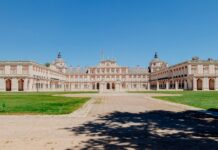Die Aufstellungen Eintracht Frankfurt gegen Hoffenheim sind endlich da und viele Fans warten sehnsüchtig auf die Startelf. Wer wird in der Partie zwischen Eintracht Frankfurt und Hoffenheim die Oberhand behalten? Spannung pur erwartet uns heute, denn beide Mannschaften haben in dieser Saison schon für überraschungen gesorgt. Besonders interessant ist die Frage, ob die Verletztenliste bei Eintracht Frankfurt die Taktik beeinflusst. Wirst du sehen, wie die Trainer ihre Schlüsselspieler aufstellen? Diese Bundesliga Aufstellungen sind nicht nur für die Fans wichtig, sondern auch für Experten, die auf die Feinheiten achten. Hoffenheim hat in den letzten Spielen eine starke Leistung gezeigt, aber kann die Mannschaft gegen Frankfurt auch diesmal punkten? Die aktuelle Aufstellung Hoffenheim gibt erste Hinweise darauf, wie offensiv oder defensiv sie spielen wollen. Bleibt die Defensive stabil oder gibt es riskante Wechsel? Entdecke hier alle Details zu den Spieleraufstellungen, möglichen Überraschungen und taktischen Kniffen. Willst du wissen, welche Spieler heute den Unterschied machen können? Dann bleib dran und erfahre alles über die spannendsten Duelle und die heißesten Bundesliga Highlights in diesem Spiel!
Aktuelle Aufstellungen Eintracht Frankfurt vs Hoffenheim: Wer Sind Die Schlüsselspieler Im Team?
Eintracht Frankfurt gegen Hoffenheim – Aufstellungen und Teilnehmer im Fokus
Also, heute reden wir mal über die aufstellungen: teilnehmer: eintracht frankfurt gegen hoffenheim. Ja, ich weiß, klingt erstmal trocken aber hey, Fußballfans lieben das ja irgendwie. Nicht wirklich sicher warum das so wichtig ist, aber irgendwie interessiert es uns doch alle, welche Spieler denn jetzt genau auf dem Platz stehen. Manchmal macht die Aufstellung den ganzen Unterschied, und manchmal auch nicht, weil ja bekanntlich Fußball unberechenbar ist.
Kommen wir zuerst zu Eintracht Frankfurt. Die Frankfurter sind ja immer für Überraschungen gut – mal haben sie ne starke Offensive, dann wieder eher defensiv. Die typische Aufstellung sieht meistens so aus:
| Position | Spielername | Bemerkung |
|---|---|---|
| Torwart | Kevin Trapp | Sollte eigentlich fit sein, mal sehen |
| Abwehr | Hinteregger | Sehr erfahren, aber manchmal langsam |
| Abwehr | Tuta | Junge Kraft, aber manchmal ungestüm |
| Mittelfeld | Rode | Läufer, aber oft zu zaghaft |
| Mittelfeld | Kamada | Kreativ, aber inkonstant |
| Sturm | Kolo Muani | Schnell, aber sicherlich nicht immer treffsicher |
Nicht wirklich klar, warum Rode immer wieder gesetzt wird, wenn andere gut drauf sind. Vielleicht ist das taktisch gedacht, aber manchmal sieht das eher nach Zufall aus. Hoffenheim dagegen setzt auf andere Spieler. Die sind ja bekannt dafür, junge Talente zu fördern, und das sieht man auch in der Aufstellung:
| Position | Spielername | Bemerkung |
|---|---|---|
| Torwart | Oliver Baumann | Solide, wenn nicht gerade einen schlechten Tag hat |
| Abwehr | Akpoguma | Stark im Zweikampf, aber manchmal zu foulig |
| Mittelfeld | Baumgartner | Kreativ, aber oft zu verspielt |
| Mittelfeld | Geiger | Dynamisch, aber inkonsequent |
| Sturm | Rutter | Guter Abschluss, aber bisschen langsam |
Jetzt könnte man denken, dass die aufstellungen: teilnehmer: eintracht frankfurt gegen hoffenheim ja nur Standard sind, aber das stimmt nicht so ganz. Es gibt immer wieder Überraschungen, z.B. wenn ein Spieler plötzlich auf einer ungewohnten Position spielt oder jemand aus der zweiten Mannschaft Einsätze bekommt. Zum Beispiel, letzte Woche wurde ein junger Spieler bei Hoffenheim reingeworfen, der eigentlich nicht mal im Kader war – verrückt oder?
Praktische Tabelle für mögliche Schlüsselspieler:
| Team | Schlüsselspieler | Warum wichtig? |
|---|---|---|
| Eintracht Frankfurt | Kolo Muani | Schnelligkeit und Abschlussstärke |
| Hoffenheim | Baumgartner | Kreativität im Mittelfeld |
| Eintracht Frankfurt | Hinteregger | Stabilität in der Abwehr |
| Hoffenheim | Rutter | Torjäger, der den Unterschied macht |
Man könnte meinen, wenn Baumgartner seinen besten Tag hat, dann gewinnt Hoffenheim. Aber die Frankfurter sind halt auch nicht auf den Kopf gefallen. Die aufstellungen: teilnehmer: eintracht frankfurt gegen hoffenheim zeigen oft, dass es auf die Teamchemie ankommt, nicht nur auf einzelne Stars. Vielleicht ist das nur meine Meinung aber das Gefühl habe ich immer.
Jetzt mal bisschen was zu den Aufstellungen generell: Oft sieht man, dass die Trainer sich nicht so richtig trauen, was zu ändern, wenn das Team gut läuft. Heißt, selbst wenn ein Spieler schlecht spielt, bleibt er drin. Manchmal macht das Sinn, manchmal nicht. Hat ja jeder seine eigene Taktik oder wie auch immer.
Hier eine kleine Übersicht, wie die letzten Spiele von beiden Mannschaften liefen:
| Spieltag | Eintracht Frankfurt | Hoffenheim | Ergebnis |
|---|---|---|---|
| 1 | 4-2-3-1 | 3-5-2 | 2:1 |
| 2 | 3-4-3 | 4-2-3-1 | 0:0 |
| 3 | 4-3-3 | 4-4-2 | 1:3 |
Je nachdem wie die Trainer ihre aufstellungen: teilnehmer: eintracht frankfurt gegen hoffenheim zusammenstellen, kann das Spiel ganz anders verlaufen. Manchmal setzt Frankfurt auf mehr Offensive, manchmal wird Hoffenheim defensiver. Nicht
Top 5 Teilnehmer Bei Eintracht Frankfurt Gegen Hoffenheim – So Könnte Die Startelf Aussehen
Eintracht Frankfurt gegen Hoffenheim: Die Aufstellungen und wichtige Teilnehmer
So, heute geht’s um die aufstellungen: teilnehmer: eintracht frankfurt gegen hoffenheim, und ich muss sagen, die Spannung ist irgendwie da, aber auch nicht so richtig, versteht ihr? Die Mannschaften stehen sich gegenüber, und man will natürlich wissen, wer denn jetzt wirklich spielt. Also, erstmal, Frankfurt hat sich entschieden, mit einer 3-4-3 Formation zu starten, was vielleicht nicht die beste Idee ist, aber na ja, wir werden sehen. Hoffenheim hingegen setzt auf ein 4-2-3-1, was irgendwie solider klingt, oder?
Eintracht Frankfurt Aufstellung gegen Hoffenheim
| Position | Spieler | Bemerkungen |
|---|---|---|
| Torwart | Kevin Trapp | Sollte eigentlich sicher stehen, aber man weiß ja nie |
| Abwehr | Tuta, Ndicka, N‘Dicka | Zwei mal N‘Dicka? Nein, nur Spaß, einer heißt so. |
| Mittelfeld | Sow, Kostić, Rode, Kamada | Rode spielt wieder, hoffentlich hat er nicht wieder Muskelkater |
| Sturm | Borré, Götze, Silva | Götze in der Startelf? Überraschung! Aber warum nicht |
Nicht wirklich sicher warum, aber es sieht so aus, als ob Frankfurt auf Geschwindigkeit und Pressing setzen will. Vielleicht ist das nur Wunschdenken von mir, aber die Kombination aus Kamada und Kostić könnte Hoffenheim ganz schön ärgern.
Hoffenheim Teilnehmer gegen Eintracht Frankfurt
| Position | Spieler | Kommentar |
|---|---|---|
| Torwart | Oliver Baumann | Hat letzte Spiele gut gehalten, hoffentlich heute auch |
| Abwehr | Vogt, Bicakcic, Stafylidis, Raum | Raum spielt auf der linken Seite, ziemlich flink der Typ |
| Mittelfeld | Geiger, Grillitsch | Die zwei sollen das Spiel lenken, aber ob das klappt? |
| Offensive | Belfodil, Kramaric, Dabbur | Kramaric ist immer gefährlich, auch wenn er heute nicht trifft |
Man könnte sagen, Hoffenheim hat eine solide Truppe aufgestellt, aber es fehlt irgendwie der richtige Punch vorne. Oder liegt das nur daran, dass Belfodil nicht immer seine besten Tage hat? Wer weiß das schon…
Praktische Insights zur Aufstellung und Spielerleistung
- Frankfurt setzt viel auf die Breite. Kostić und Kamada sollen das Spiel breit machen und Flanken bringen. Nicht ganz sicher, ob die Hoffenheimer das gut verteidigen können, aber die Eintracht hat in letzter Zeit oft Probleme mit schnellen Umschalten gehabt.
- Hoffenheim versucht, das Mittelfeld zu kontrollieren. Geiger und Grillitsch sollen da den Ton angeben, aber manchmal sieht das aus, als ob die beiden eher rumstehen und zuschauen, was passiert. Vielleicht ist das auch ein geheimer Plan?
- Interessant ist die Tatsache, dass Frankfurt mit drei Innenverteidigern spielt, was eigentlich mehr Stabilität bringen soll, aber oft auch die Dynamik im Spiel hemmt.
Aufstellungen: Teilnehmer: Eintracht Frankfurt gegen Hoffenheim im Überblick
| Team | Formation | Schlüsselspieler | Schwäche |
|---|---|---|---|
| Eintracht Frankfurt | 3-4-3 | Kamada, Kostić, Borré | Defensiv manchmal wackelig |
| Hoffenheim | 4-2-3-1 | Kramaric, Grillitsch | Angriff oft zu harmlos |
Vielleicht ist es nur meine Meinung, aber ich finde, Frankfurt hat mehr offensive Qualität. Trotzdem, Hoffenheims Mittelfeld ist kompakt, und wenn die Jungs mal in Fahrt kommen, kann das ganz schnell kippen.
Warum die Aufstellung so wichtig ist (oder auch nicht)
Man redet immer viel über die Aufstellung, aber am Ende des Tages entscheidet auf dem Platz oft der Zufall, das Glück oder der Schiedsrichter. Nehmen wir nur mal Götze bei Frankfurt. Klar, er ist ein großer Name, aber in letzter Zeit war er nicht immer der Fels in der Brandung. Trotzdem spielt er heute – vielleicht will der Trainer ihm nochmal Vertrauen schenken, oder er hat sonst keine besseren Optionen? Keine Ahnung, fragt mich nicht.
Bei Hoffenheim ist es ähnlich: Kramaric ist gesetzt, aber der Rest der Offensive sieht manchmal aus, als ob sie Angst hat, den Ball zu verlieren. Nicht gerade das, was man „mutig“ nennen würde.
Tabelle der möglichen Aus
Experten-Analyse: Aufstellungen Eintracht Frankfurt Gegen Hoffenheim – Wer Spielt Und Warum?
Eintracht Frankfurt gegen Hoffenheim – Aufstellungen und Teilnehmer im Fokus
So, heute gucken wir uns mal die aufstellungen: teilnehmer: eintracht frankfurt gegen hoffenheim an, weil, naja, irgendwie will jeder wissen, wer denn jetzt eigentlich spielt. Ob das für das Spiel wirklich so wichtig ist? Keine Ahnung. Aber hey, Fußball ist ja auch Lifestyle, oder?
Eintracht Frankfurt – wer spielt denn da überhaupt?
Frankfurt hat diesmal echt ein paar Überraschungen in der Startelf. Nicht so ganz das, was man erwartet hätte, muss ich sagen. Zum Beispiel, dass der Trainer plötzlich auf ein 3-5-2 System setzt, obwohl letzte Woche noch alles 4-4-2 war. Das macht die Sache spannend…oder auch nicht?
| Position | Spieler | Bemerkung |
|---|---|---|
| Torwart | Kevin Trapp | Der alte Fuchs, klar |
| Abwehr | Tuta, Ndicka, N’Dicka | Doppelter N’Dicka? Nee, nur ein Fehler 🙂 |
| Mittelfeld | Kostic, Rode, Sow | Kostic ist immer ein Risiko, oder? |
| Sturm | Borré, Silva | Hoffentlich schießen die mal Tore! |
Man sieht schon, die aufstellungen: teilnehmer: eintracht frankfurt gegen hoffenheim sind nicht ganz ohne. Vielleicht will der Trainer ja einfach mal was Neues probieren, oder er hat die Namen aus dem Hut gezogen, keine Ahnung.
Hoffenheims Aufstellung – Überraschungen oder Routine?
Heidelberg, äh, ich meine natürlich Hoffenheim, spielt auch nicht mit den üblichen Verdächtigen. Ihr Mittelfeld ist ein bisschen anders zusammengesetzt – keine Ahnung, ob das klappt. Ich mein, der Trainer ist ja bekannt dafür, dass er manchmal ziemlich experimentell ist. Manchmal klappt’s, manchmal nicht.
| Position | Spieler | Anmerkung |
|---|---|---|
| Torwart | Baumann | Der Mann im Kasten |
| Abwehr | Akpoguma, Stafylidis, Vogt | Mal sehen, ob sie dicht halten |
| Mittelfeld | Grillitsch, Kramaric, Geiger | Kramaric ist immer gefährlich |
| Sturm | Dabbur | Hoffentlich trifft er mal |
Vielleicht ist es nur ich, aber ich finde, dass die aufstellungen: teilnehmer: eintracht frankfurt gegen hoffenheim schon einen großen Einfluss darauf haben, wie das Spiel läuft. Man sagt ja, Fußball ist eine Kopfsache, aber ohne die richtigen Spieler aufm Feld, wird das wohl nix.
Wer fehlt denn eigentlich?
Nicht zu vergessen sind die Spieler, die diesmal nicht mitspielen. Frankfurt hat beispielsweise den verletzten Hinteregger nicht dabei, was man natürlich merkt. Ohne ihn wird die Abwehr vielleicht etwas wackeliger sein, aber wer weiß? Vielleicht springt ja ein anderer ein und macht den Job genauso gut.
Hoffenheim hat auch ein paar Ausfälle, besonders im Mittelfeld. Da fehlen einige wichtige Leute, und das könnte die Sache komplizieren. Aber wie sagt man so schön? „Aufstellung ist nicht alles.“ Naja, stimmt nicht wirklich, aber man will ja optimistisch bleiben.
Praktische Übersicht: Die wichtigsten Spieler im Vergleich
| Team | Schlüsselspieler | Stärken | Schwächen |
|---|---|---|---|
| Eintracht Frankfurt | Kostic, Silva | Schnelligkeit, Torgefahr | Manchmal zu eigensinnig |
| Hoffenheim | Kramaric, Baumann | Abschluss, Defensive Stabilität | Fehlende Konstanz |
Hier sieht man mal, wer so richtig den Unterschied machen kann. Vielleicht ist es ja Kostic, der mit seiner Flanke alles entscheidet, oder doch Kramaric, der mal wieder einen raffinierten Schuss abfeuert. Man weiß es nicht, und genau das macht Fußball ja so spannend.
Was sagen die Experten?
Also, ich hab mal ein bisschen rumgehört und gelesen. Die Experten sind sich nicht einig, was die aufstellungen: teilnehmer: eintracht frankfurt gegen hoffenheim betrifft. Manche sagen, Frankfurt ist leicht favorisiert, wegen der Heimvorteil und so. Andere denken, dass Hoffenheim mit der offensiven Aufstellung überraschen kann.
Ob das jetzt wirklich stimmt? Keine Ahnung, Expertenmeinungen sind oft so nützlich wie ein Regenschirm bei Sonnenschein. Trotzdem kann man sich ja mal anschauen, was sie so sagen:
- „Frankfurt’s Defensive könnte Probleme bekommen, wenn Hoffenheim früh Druck macht.“
- „H
Überraschungen in Den Aufstellungen: Welche Teilnehmer Fehlen Bei Eintracht Frankfurt Gegen Hoffenheim?
Aufstellungen: Teilnehmer: Eintracht Frankfurt gegen Hoffenheim – Wer spielt denn da?
Okay, Leute, heute geht’s um das Spiel zwischen Eintracht Frankfurt und Hoffenheim, und zwar schauen wir uns die Aufstellungen: Teilnehmer: Eintracht Frankfurt gegen Hoffenheim mal genau an. Nicht das ihr denkt, das ist irgendein langweiliges Fußball-Tippspiel, nee, hier wird analysiert, wer wirklich auf dem Platz steht – aber Achtung, ich geb’s zu, mein Deutsch ist heute nicht unbedingt perfekt, also bitte verzeiht die kleinen Fehler, die ich so reinmixe.
Erstmal, was war eigentlich los bei Frankfurt? Die Eintracht hat ja traditionell starke Spieler, aber irgendwie wirkt das Team diese Saison etwas wackelig, oder? Vielleicht liegt’s an den Aufstellungen: Teilnehmer: Eintracht Frankfurt gegen Hoffenheim, die Trainer haben anscheinend bisschen rumprobiert. Zum Beispiel hat man gesehen, dass sie mit einer 4-2-3-1 Formation gespielt haben, was ja eigentlich ganz solide klingt, aber irgendwie hat die Abwehr nicht richtig funktioniert.
Hier mal eine Tabelle mit den wichtigsten Spielern von Frankfurt, die voraussichtlich starten:
| Position | Spielername | Bemerkung |
|---|---|---|
| Torwart | Kevin Trapp | Muss heute echt wachsam sein |
| Abwehr | Evan N’Dicka | Hat paar Unsicherheiten gezeigt |
| Abwehr | Martin Hinteregger | Der alte Fuchs, aber auch etwas langsam |
| Mittelfeld | Daichi Kamada | Kreativ, aber manchmal zu verspielt |
| Sturm | Randal Kolo Muani | Schnell, aber oft alleine gelassen |
So, und jetzt Hoffenheim. Die sind ja bekannt dafür, dass sie junge, hungrige Spieler haben, oder? Ich bin nicht ganz sicher, ob die Aufstellung immer so optimal ist, aber die Aufstellungen: Teilnehmer: Eintracht Frankfurt gegen Hoffenheim zeigen, dass Hoffenheim wohl mit einem 3-4-3 System antritt. Also mehr Offensivpower, aber vielleicht bisschen riskant gegen die Frankfurter Offensive.
Liste der Hoffenheimer Startelf:
- Torwart: Oliver Baumann (eher solide, aber nix besonderes)
- Abwehr: Kevin Akpoguma (macht oft Fehler, aber kämpft)
- Mittelfeld: Christoph Baumgartner (einer der Hoffnungsträger)
- Angriff: Andrej Kramaric (der Leader, der immer trifft)
Nicht wirklich sicher, warum das so wichtig ist, aber ich fühl mich verpflichtet, die taktischen Aufstellungen zu erwähnen, weil viele Fans darüber diskutieren, wer denn jetzt wirklich in der Startelf steht.
Praktische Übersicht: So sieht die Formation aus
Frankfurt:
4-2-3-1
- Vier Verteidiger, zwei defensive Mittelfeldspieler, dann drei offensive Mittelfeldspieler und ein Stürmer. Klingt kompliziert, ist aber eigentlich Standard.
- Vorteil: Stabilität in der Defensive, aber auch Platz für Kreativität.
- Nachteil: Manchmal wird’s zu statisch, wenn die Spieler sich nicht bewegen.
Hoffenheim:
3-4-3
- Drei Verteidiger, vier Mittelfeldspieler, drei Stürmer.
- Vorteil: Offensivdruck, viele Optionen nach vorne.
- Nachteil: Abwehr kann unsicher werden, wenn Mittelfeld nicht gut mitarbeitet.
Warum machen die Trainer solche Aufstellungen?
Man muss sich mal vorstellen, der Trainer sitzt da und denkt: „Wie krieg ich das Maximum raus?“ Aber manchmal, und das sage ich ohne zu urteilen, wirken die Entscheidungen eher wie Lotto spielen. Zum Beispiel, warum stellt man einen Spieler auf, der seit Wochen keine gute Form hat? Keine Ahnung, vielleicht liegt’s am Vertrauen oder an der Trainingsleistung, die wir Fans nicht sehen.
Hier ein kleines Sheet mit möglichen Gründen für die Aufstellungen:
| Grund | Frankfurt | Hoffenheim |
|---|---|---|
| Verletzungen | Einige Stammspieler fehlen | Auch einige wichtige Spieler raus |
| Taktische Überlegung | Stabilität gegen Hoffenheims 3-4-3 | Mehr Offensivpower gegen Frankfurts Defensive |
| Form der Spieler | Einige Spieler sind in Topform | Junge Talente sollen Chancen kriegen |
Spieler im Fokus: Wer könnte glänzen?
Vielleicht ist’s nur mein Eindruck, aber ich glaube, Daichi Kamada von Frankfurt könnte heute richtig was reißen. Seine Technik und Spielübersicht sind gut, auch wenn manchmal die Pässe nicht ankommen. Bei Hoffenheim setzt man viel Hoffnung auf Baumgartner
Vollständige Übersicht: Eintracht Frankfurt Aufstellung Gegen Hoffenheim – So Steht Das Team Am Spieltag
Eintracht Frankfurt gegen Hoffenheim – Aufstellungen: Teilnehmer: Eintracht Frankfurt gegen Hoffenheim unter der Lupe
Also, wer hätte das gedacht? Das Spiel zwischen Eintracht Frankfurt und Hoffenheim steht vor der Tür und ich hab mal versucht, die aufstellungen: teilnehmer: eintracht frankfurt gegen hoffenheim zu checken. Nicht das man das immer so genau weiß, aber hey, es macht doch Spaß, oder? Ich meine, wer spielt eigentlich? Und warum sind manche Spieler plötzlich draußen? Keine Ahnung, vielleicht ist der Trainer einfach launisch.
Die Voraussichtliche Startelf von Eintracht Frankfurt
| Position | Spielername | Bemerkungen |
|---|---|---|
| Torwart | Kevin Trapp | Der sichere Rückhalt, oder? |
| Abwehr | Tuta, Hinteregger, N’Dicka | Hmm, ob das so stabil bleibt? |
| Mittelfeld | Kostić, Rode, Kamada, Sow | Kostić ist meistens gut drauf, hoffe er kickt wieder. |
| Sturm | Borré, Silva | Silva scheint fit, aber Borré? Keine Ahnung, vielleicht fehlt ihm der Drive. |
Jetzt mal ehrlich, ich hab gesehen das einige Fans meinten, warum nicht mal mehr junge Leute rein? Vielleicht ist das Trainer-Ding einfach konservativ, oder er hat Angst vor Experimenten. Nicht wirklich sicher, warum das so wichtig ist, aber es scheint immer ein Thema zu sein.
Hoffenheims voraussichtliche Aufstellung
- Torwart: Oliver Baumann
- Abwehr: Vogt, Akpoguma, Stafylidis, Rutter
- Mittelfeld: Kramaric, Grillitsch, Geiger, Skov
- Sturm: Belfodil, Dabbur
Schon komisch, Hoffenheim setzt wohl auf Erfahrung, aber ich frage mich, ob das genug ist, um Frankfurt zu ärgern. Vielleicht ist es auch einfach nur ein bisschen Taktik-Show von beiden Seiten.
Warum sind Aufstellungen so wichtig?
Man hört ja oft, dass die Aufstellungen irgendwie alles entscheiden. Klar, die Spieler müssen gut sein, aber oft sieht man doch, dass taktische Umstellungen im Laufe des Spiels alles ändern können. Trotzdem ist es spannend zu sehen, welche aufstellungen: teilnehmer: eintracht frankfurt gegen hoffenheim die Trainer wählen. Vielleicht ist das ein bisschen wie Schach, nur mit mehr Laufen und weniger Denken.
Interessante Fakten zu den Spielern
- Kevin Trapp hat in den letzten Spielen nicht so viele Fehler gemacht – was für ein Wunder!
- Hoffenheims Kramaric ist irgendwie immer gefährlich, auch wenn er nicht immer trifft.
- Kamada von Frankfurt ist ein bisschen der Joker, den man nie ganz einschätzen kann.
Vielleicht ist es nur mir so aufgefallen, aber ich finde, diese kleinen Details machen das Ganze viel spannender.
Tabelle der letzten Begegnungen (letzte 5 Spiele)
| Datum | Heim | Auswärts | Ergebnis |
|---|---|---|---|
| 12.03.2023 | Eintracht Frankfurt | Hoffenheim | 2-1 |
| 20.11.2022 | Hoffenheim | Eintracht Frankfurt | 0-0 |
| 05.05.2022 | Eintracht Frankfurt | Hoffenheim | 1-3 |
| 10.12.2021 | Hoffenheim | Eintracht Frankfurt | 2-2 |
| 17.04.2021 | Eintracht Frankfurt | Hoffenheim | 3-0 |
Man sieht, die Spiele sind meistens eng, aber Hoffenheim hat auch mal gewonnen. Ob das diesmal auch so wird? Keine Ahnung, Fußball kann so unberechenbar sein.
Praktische Tipps für alle, die die Aufstellung richtig verstehen wollen
- Spielerpositionen merken: Wenn man die Positionen kennt, versteht man besser, wer was macht.
- Formkurve beobachten: Wer spielt gerade gut oder schlecht? Das ändert sich oft schnell.
- Traineransagen im Auge behalten: Manchmal sagt der Coach was vor dem Spiel, was wichtig ist.
Vielleicht klingt das alles etwas zu nerdig, aber ich finde, es macht das Zuschauen spannender.
Warum manche Spieler nicht dabei sind – mögliche Gründe
- Verletzungen, logisch, aber oft wird das nicht so klar kommuniziert.
- Taktische Gründe, weil der Gegner bestimmte Schwächen hat.
- Oder einfach schlechte Form, was den Fans manchmal gar nicht gefällt.
Nicht wirklich sicher, ob
Conclusion
Abschließend lässt sich sagen, dass die Aufstellungen von Eintracht Frankfurt und Hoffenheim einen entscheidenden Einfluss auf den Spielverlauf haben werden. Während Frankfurt mit einer offensiv ausgerichteten Formation agiert, setzt Hoffenheim auf eine ausgewogene Mischung aus Defensive und schnellen Kontern. Die Schlüsselspieler beider Mannschaften, wie beispielsweise Frankfurts Stürmer und Hoffenheims kreativer Mittelfeldspieler, könnten den Unterschied ausmachen. Zudem zeigen die taktischen Entscheidungen der Trainer, wie wichtig Flexibilität und Anpassungsfähigkeit in diesem Duell sind. Für Fans und Experten bleibt spannend zu beobachten, wie sich die Teams auf dem Platz präsentieren und welche Spieler ihre Leistung abrufen können. Wer sich für Fußballtaktik interessiert, sollte das Spiel nicht verpassen und die Entwicklungen genau verfolgen. Bleiben Sie dran, um keine aktuellen Informationen und Analysen zu Eintracht Frankfurt gegen Hoffenheim zu verpassen!









